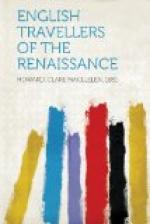Footnote 359: Albert Babeau, Les Voyageurs en France, Paris, 1885, p. 175.
Footnote 360: M. Adrien Delahaute, Une Famille
de Finance an XVIII.
Siecle, vol. i. p. 434.
Footnote 361: George Sandys, A Relation of a Journey begun in An. Dom. 1610, London, 1615.
Footnote 362: John Evelyn, Diary and Correspondence, ed. Bray, London, 1906, vol. i. p. 77.
Footnote 363: Ibid., p. 78.
Footnote 364: Balthazar Gerbier, Subsidium Peregrinantibus, Oxford, 1665.
Footnote 365: Letter to his Son, Feb. 22, 1748.
Footnote 366: Ibid., Oct. 2, O.S., 1747.
Footnote 367: Letter to his Son, Oct. 9, O.S., 1747.
Footnote 368: Lausanne was where Edward Gibbon received the education he considered far superior to what could be had from Oxford. When he returned to England, after four years, he missed the “elegant and rational society” of Lausanne, and could not love London—“the noisy and expensive scene of crowds without company, and dissipation without pleasure.”
Footnote 369: Letter to his Son, April 12, O.S., 1749.
Footnote 370: Ibid., Sept. 22, O.S., 1749.
Footnote 371: Ibid., Sept. 5, O.S., 1749.
Footnote 372: Letter to his Son, Nov. 8, O.S., 1750.
Footnote 373: Letter to his Son, May 10, O.S., 1748.
Footnote 374: Letter to his Son, April 30, O.S., 1750.
Footnote 375: Letters from Paris, Sept. 22, 26; Oct. 3, 6, 1765.
Footnote 376: A Character of England, As it was
lately presented in a
Letter to a Noble Man of France, London, 1659.
Footnote 377: See Voltaire, Lettres Philosophiques, tome ii. p. 272, ed. Gustave Lanson, Paris, 1909.
Footnote 378:
“The merest John Trot
in a week you shall see
Bien poli, bien frize, tout
a fait un Marquis.”
(Samuel Foote, Dramatic Works, vol. i. p. 47.)
The Hon. James Howard, The English Mounsieur,
London, 1674; Sir George
Etherege, Sir Fopling Flutter, Love in a Tub,
Act III. Sc. iv.
The Abbe le Blanc on visiting England was very indignant at the representation of his countrymen on the London stage: he describes how, “Two actors came in, one dressed in the English manner very decently, and the other with black eye-brows, a riband an ell long under his chin, a big peruke immoderately powdered, and his nose all bedaubed with snuff. What Englishman could not know a Frenchman by this ridiculous picture?... But when it was found that the man thus equipped, being also laced down every seam of his coat, was nothing but a cook, the spectators were equally charmed and surprised. The author had taken care to make him speak all the impertinences he could devise.... There was a long criticism upon our manners, our customs and above all, our cookery. The excellence and virtues of English beef were cried up; the author maintained that it was owing to the quality of its juice that the English were so courageous, and had such a solidity of understanding which raised them above all the nations of Europe” (E. Smith, Foreign Visitors In England, London, 1889, pp. 193-4).




